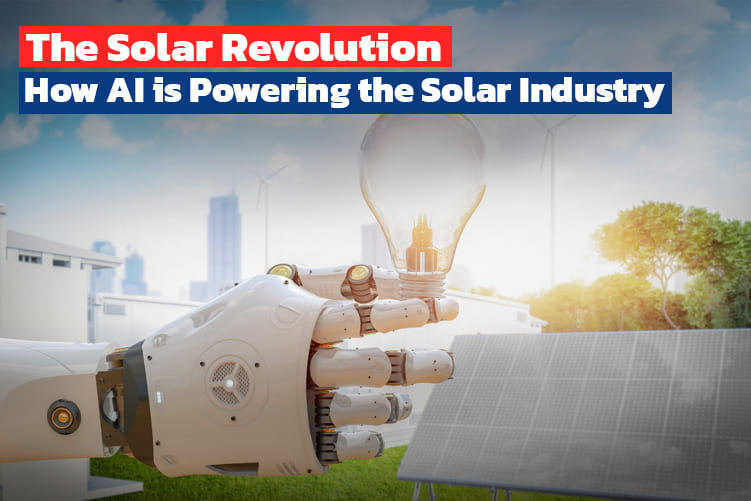The energy landscape is undergoing a dramatic transformation, driven by advancements in technology and a growing urgency to shift to sustainable energy sources. Solar power has emerged as a frontrunner in this transformation, and one of the most exciting developments in the field is the integration of artificial intelligence (AI). AI is revolutionizing the solar industry, making it more efficient, accessible, and sustainable than ever before. Let’s explore how AI is driving this revolution and the role it plays in the future of solar energy.
1. Predictive Analytics for Improved Efficiency
One of the most significant ways AI is impacting the solar industry is through predictive analytics. Solar energy production is highly dependent on environmental factors such as weather conditions, cloud cover, and temperature.
AI systems can analyze vast amounts of data and use machine learning algorithms to predict how these factors will affect solar panel performance.
This enables solar plant operators to make real-time adjustments to optimize energy generation.
By accurately forecasting energy output, solar plants can ensure they deliver a consistent supply of electricity to the grid.
2. Enhanced Monitoring and Maintenance
AI-driven monitoring and maintenance systems have proven to be a game-changer for solar installations.
These systems use sensors and cameras to continuously monitor the condition of solar panels and the overall performance of a solar plant.
When an issue is detected, AI algorithms can pinpoint the exact location of the problem, allowing for quicker and more precise maintenance.
This predictive maintenance approach minimizes downtime and reduces operational costs.
For example, if a solar panel begins to underperform due to dust or debris accumulation, AI systems can trigger automated cleaning processes.
By integrating cleaning robots or drones, these systems can efficiently remove dirt and ensure that solar panels operate at peak efficiency.
This reduces the need for manual inspections and maintenance, making solar energy a more reliable and cost-effective energy source.
3. Grid Integration and Energy Storage
AI is also playing a crucial role in integrating solar power into the electrical grid.
The intermittent nature of solar energy generation has traditionally posed challenges for grid stability.
However, AI-based energy management systems can predict when solar generation will be highest and automatically adjust grid operations to accommodate this influx of power.
These systems work in tandem with energy storage solutions, such as batteries, to store excess energy during sunny days and release it when needed. This ensures a constant and reliable energy supply to consumers.
4. Cost Reduction Through Automation
The use of AI in solar energy is contributing to significant cost reductions.
Automation is streamlining various processes, from solar panel manufacturing to installation. Robots can efficiently assemble solar panels, reducing labor costs and production time.
Additionally, AI algorithms can design optimal solar panel layouts for maximum energy capture.
In the installation phase, AI-powered drones equipped with cameras can assess rooftops or solar plant sites to create detailed 3D models. These models help determine the best locations for solar panels, ensuring optimal sunlight exposure. The precise placement of panels maximizes energy generation and minimizes installation errors.
5. Personalized Solar Solutions
AI is making solar energy more accessible to individual consumers.
AI-powered tools and platforms can analyze a household’s energy consumption patterns and design personalized solar solutions.
By considering factors like roof size, location, and energy needs, AI systems can recommend the ideal solar panel setup and energy storage solutions.
This personalized approach is helping homeowners make more informed decisions about adopting solar energy and tailoring systems to their specific requirements.
6. Enhancing Grid Resilience
As the world faces an increasing number of extreme weather events and natural disasters, grid resilience is a top priority.
AI is being used to enhance the resilience of solar microgrids. By continuously monitoring weather patterns and grid performance, AI systems can predict potential disruptions and autonomously take corrective actions.
This ensures that critical infrastructure, such as hospitals and emergency services, remains powered during emergencies.
The Road Ahead
AI is set to play an even more significant role in the future of the solar industry.
As technology advances, we can expect more efficient and cost-effective solar solutions, along with expanded access to clean energy. The integration of AI will help accelerate the transition to a sustainable energy future, reducing greenhouse gas emissions and minimizing our reliance on fossil fuels.
At Solar Miner , we are committed to adopting the power of AI to provide cutting-edge solar solutions to our customers.
We believe that the fusion of AI and solar energy will pave the way for a greener, more sustainable world. As AI continues to evolve, so does the potential for solar energy. Together, we are shaping a brighter future powered by the sun.






